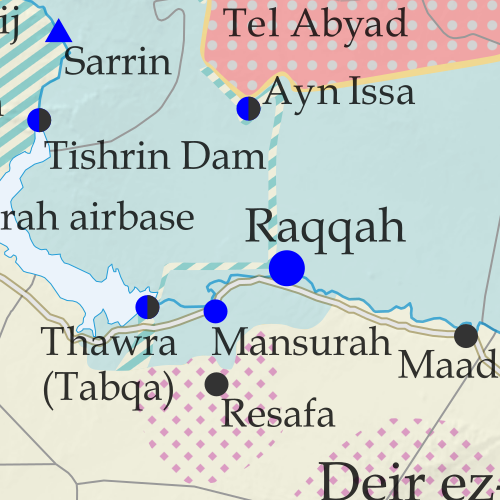#syria war
Subscribers: PolGeoNow’s Syria map has been updated for the events of the past four months, with the so-called “Islamic State” (ISIS/ISIL) losing its last firmly-controlled site in the central desert. However, the group is still very much active, operating from mobile camps, and we’ve illustrated its major areas of presence with a new symbol on the map.
More info: https://www.polgeonow.com/2020/11/syria-control-map-isis-still-active.html
Post link
Killing Sulaimani- How The Butcher of the People Became an Anti-Imperialist Hero - Hawzhin Azeez
“You can cheer the end of Sulaimani and still be anti-war. You can condemn the way Sulaimani was executed but still be relieved that he is no longer around to terrorize people. You can be anti-US imperialism and anti-Iranian dictatorship and brutality. Being anti-US imperialism, being anti-Trump’s reckless disregard for humanity does not mean that you should make Sulaimani a symbol of freedom, or Leftist ideology. Sulamani was a butcher. Trump is a dangerous megalomanic. The Ayatollah’s are just as guilty, dripping with the blood of millions across the region funding terrorist groups and proxy wars. Let Sulaimani die the butcher he was, with a fitting illegal end- the same he dished out to thousands-, without turning him into an anti-imperialist hero of the people- and by extension justifying the Iranian regime. The only loyalty you should have should be for the ordinary people of Iran, Iraq and the region. It is 2020, and it is about time we started viewing such issues in all their complexities, realizing that multiple truths can co-exist and that a simplistic analysis serves no one but those hungering for war.”

Afghanistan. Iraq. Syria. Yemen. Libya. The cycle continues through US interventionism, neocolonialism, imperialism and industrial war machine.

Blame the system. Blame the ideology. Blame those that uphold and support and voted for him.

The army is a tool of patriarchal and colonial violence.

Please be careful out there. Black Lives Matter. Love and solidarity.

As middle easterners we’re really wondering about this.

It’s harder than ever to be brown or visibly Muslim in the West.

Important reminder that the evils of our governments does not represent the people who only want peace. The difference between you and I, my friend, is far smaller than the difference between our governments.
Please don’t let Hasankeyf be destroyed. 12,000 years of history, culture and life cannot be erased with bombs to build a dam designed to terrorize with water and resource wars. Please, urgently sign the petition HERE to put a stop to this dam. The dam is organised to start on the 10th of June.
Post link







President Bashar al Assad | Sednaya 4 - 7 - 2019
On World Cancer Day, cancer treatment still free in Syria despite sanctions and high costs

Damascus, SANA – At the eve of World Cancer Day, which is marked on February 4th, figures show the growing burden cancer is placing on the world, with 18 million new cases and more than 9 million fatalities, according to the International Agency for Research on Cancer.
The latest estimations of the Agency suggest that one out of five men and one out of six women in the world will suffer from cancer during their lifetime, and one out of eight men and one out of eleven women will lose their lives due to the disease.
Despite the rising costs of treatments and the difficulties caused by the economic sanctions imposed on Syria, the Syrian health sector continues to provide free treatment services to cancer patients, including diagnosis, management, and follow-up, with the main challenge being the fact that many patients begin treatment at late stages of the disease due to various psychological or social causes.

One of the Health Ministry’s ten centers that provide free cancer treatment is Ibn al-Nafees Hospital in Damascus, which opened an oncology department in 2016 that provides surgical, chemo, hormonal, and immune therapy.
Dr. Nidal Khedr, head of the oncology department at Ibn al-Nafees, said the department has treated around 4,500 patients since its opening, at a rate of 90-100 patients and 40-60 doses per day.
Khedr said the patients who need radiation therapy are referred to Al-Bairouni University Hospital, while other services such as diagnosis, testing, and consultations are provided for free at the department.

Syria imports all types of oncology medicine, and according to Khedr the cost of treating cancer patients differs according to the type, location, characteristics, and stage of the tumor, with the least costly doses ranging from SYP 20,000 to 50,000, while some doses might cost around SYP 1.5 each, and some patients could require such doses every three weeks.
He went on to note that the most common and deadly types of cancer in Syria are lung, colon, and breast cancer, which is similar to the rest of the world.
Khedr stressed the need for raising awareness about the importance of early diagnosis of certain types of cancer, like breast, cervix, lung, and prostate cancers as this would reduce the time of treatment and increase the likelihood of recovery.
In addition to Damascus, the Health Ministry’s cancer treatment centers are located in Aleppo, Hama, Sweida, Tartous, and Homs.


